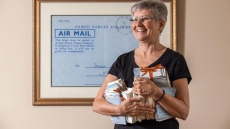OTTAWA — Concerns raised by Canadians over the Liberal government's plan to resettle 25,000 Syrian refugees included questions about whether the program should be advertised with a photo of a woman wearing a head scarf.
The photo was one of five put before eight focus groups run last November and December by the civil servants supporting the Prime Minister's Office.
They were testing ads to promote the resettlement program and were told using that photo might create a problem, a perception most common in the two Montreal groups.
"Some felt that by showing a single mother wearing a head scarf, this image may generate negative reactions among members of the general public who were reluctant to accept refugees by reinforcing some negative stereotypes associated with Syrian refugees," said a report on the discussions, posted online recently by the Privy Council Office.
Those who liked the picture said it sent an important message.
"The image showing a mother and a child was seen to elicit compassion and showed the love of a mother for her child," the report said. "It elicited a desire to help them make a better living in Canada."

The photo of the woman in the head scarf and one featuring a group of children still appear on the Immigration Department's website as the push continues to settle Syrians.
The effort to bring 25,000 to Canada in a matter of four months began in November and, a few days later, questions about it were added to the regular meetings the Privy Council Office holds with groups across the country to discuss current events.
Those in Halifax and Vancouver, B.C. were most supportive, while participants from Toronto and Montreal were more divided.
Those who supported the plan felt it was what Canada was about, the report said.
"They viewed Canada as a country of immigrants that welcomed those in need: 'This is what we do'."
Those ambivalent also felt that way, the report said, but wanted more time taken to ensure everything was done right. Those who opposed it said Canadian needs should be met first. Concerns were also raised about a lack of resources to integrate new arrivals.

Even as concepts were being tested, an online advertising campaign was rolled out.
Between Nov. 27, 2015 and the end of March, the Immigration Department spent about $166,300 for online ads, according to information released in the House of Commons.
The campaign included ads on Facebook and Twitter and $60,000 for ads that would show up on search engine websites if anyone looked up dozens of related terms, including "how to help refugees."





